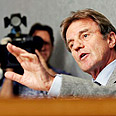
Bernard Kouchner
Photo: AFP
European Union nations failed to agree Monday on new sanctions against Iran meant to get Tehran to halt part of its nuclear program that European and other nations fear could be used to make atomic weapons.
An effort by French Foreign Minister Bernard Kouchner to get the 27-nation EU to push ahead with more sanctions -- outside of the United Nations -- failed to get widespread support, diplomats said.
Expert's Opinion
Russia expert says Israel was wrong in believing it could pressure Russia on Iran via US; 'Russia has its own interests'
But after an EU foreign ministers meeting, Kouchner said France may take additional punitive measures against Tehran on its own if the UN Security Council failed to take new measures before the end of the year.
"We could at that moment develop more individual, national sanctions," Kouchner said at a news conference.
It remains unclear if Russia or China will back additional economic or political sanctions at the UN
Last month, the five permanent members of the UN Security Council -- Britain, China, France, the United States and Russia -- and Germany agreed with the support of the EU to hold off on a new sanctions resolution until November to allow for negotiations with Iran to continue.
'EU is playing its part'
The EU foreign ministers said in a statement that the EU "will consider what additional measures it might take" after that time.
Highlighting the division over how to get Iran to stop its uranium enrichment program, Javier Solana, the EU foreign and security affairs chief, told reporters: "It remains my mandate (from the UN) to continue working on the possibility of further sanctions. We are not thinking of sanctions right now."
The EU foreign ministers warned Iran that more sanctions would be considered if it fails to cooperate. New economic and political sanctions could include investment bans or scrapping export credit guarantees.
The approach is being championed by Kouchner, who called on his EU counterparts last week to study new sanctions.
The EU, the United States and others are concerned Iran's nuclear program may be geared toward creating fissile material for nuclear warheads. Iran says its program is strictly for producing fuel for nuclear power plants. Enrichment of uranium can be used in both civilian and military programs.
British Foreign Secretary David Miliband said European trade with Iran had already fallen by about 37 percent in the year to May, signaling that the EU was serious about punishing Iran.
"The EU is playing its part in signaling very clearly to the Iranian regime that they need to abide by the successive UN Security Council resolutions," Miliband told reporters.
The EU ministers said in a statement that the EU "regretted Iran had not complied with the unanimous call of the international community to suspend all enrichment-related activity and had not accepted the offer of negotiation."
They reiterated Iran should work closely with the UN International Atomic Energy Agency and Solana.
Solana and the chief of the IAEA, Mohamed ElBaradei, are to report in mid-November to the Security Council on whether Tehran has cooperated.
Solana said last week that Iran had to show progress in international negotiations or risk new sanctions by the end of the year.
If no progress is made on two separate tracks -- talks with Solana about an offer of aid in exchange for a suspension in Iran's enrichment program and discussions with the UN atomic agency about its past activities -- they are to bring the resolution to a vote.
Kouchner said in a letter to EU ministers that sanctions could target new companies -- particularly in the banking sector -- and new individuals beyond those whose assets are already frozen or who face visa bans under current EU penalties.















